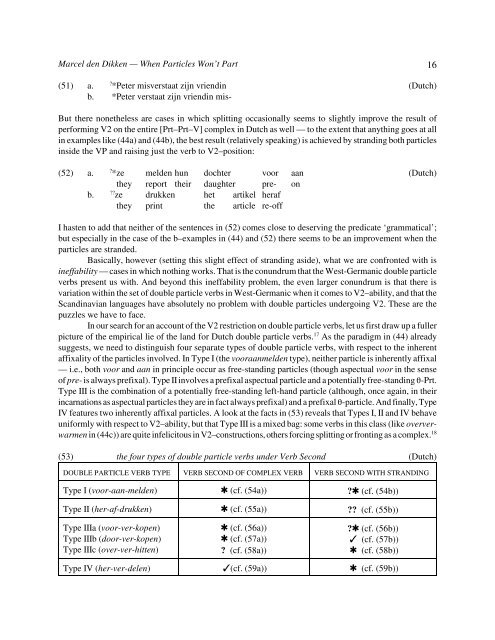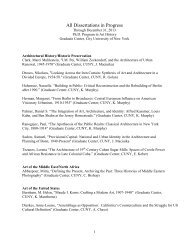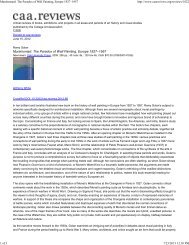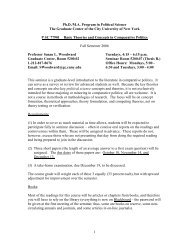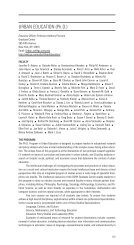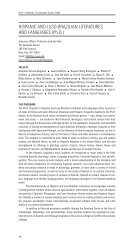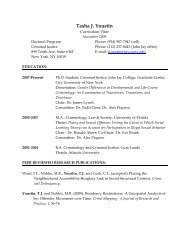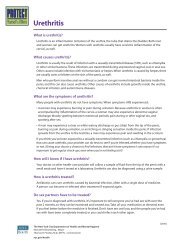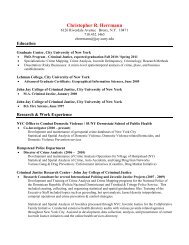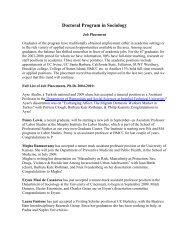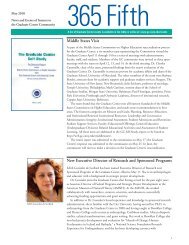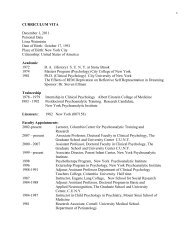When Particles Won't Part - CUNY Graduate Center
When Particles Won't Part - CUNY Graduate Center
When Particles Won't Part - CUNY Graduate Center
You also want an ePaper? Increase the reach of your titles
YUMPU automatically turns print PDFs into web optimized ePapers that Google loves.
Marcel den Dikken — <strong>When</strong> <strong><strong>Part</strong>icles</strong> Won’t <strong>Part</strong><br />
(51) a. ? *Peter misverstaat zijn vriendin (Dutch)<br />
b. *Peter verstaat zijn vriendin mis-<br />
But there nonetheless are cases in which splitting occasionally seems to slightly improve the result of<br />
performing V2 on the entire [Prt–Prt–V] complex in Dutch as well — to the extent that anything goes at all<br />
in examples like (44a) and (44b), the best result (relatively speaking) is achieved by stranding both particles<br />
inside the VP and raising just the verb to V2–position:<br />
(52) a. ? *ze melden hun dochter voor aan (Dutch)<br />
they report their daughter pre- on<br />
b. ?? ze drukken het artikel heraf<br />
they print the article re-off<br />
I hasten to add that neither of the sentences in (52) comes close to deserving the predicate ‘grammatical’ ;<br />
but especially in the case of the b–examples in (44) and (52) there seems to be an improvement when the<br />
particles are stranded.<br />
Basically, however (setting this slight effect of stranding aside), what we are confronted with is<br />
ineffability — cases in which nothing works. That is the conundrum that the West-Germanic double particle<br />
verbs present us with. And beyond this ineffability problem, the even larger conundrum is that there is<br />
variation within the set of double particle verbs in West-Germanic when it comes to V2–ability, and that the<br />
Scandinavian languages have absolutely no problem with double particles undergoing V2. These are the<br />
puzzles we have to face.<br />
In our search for an account of the V2 restriction on double particle verbs, let us first draw up a fuller<br />
picture of the empirical lie of the land for Dutch double particle verbs. 17 As the paradigm in (44) already<br />
suggests, we need to distinguish four separate types of double particle verbs, with respect to the inherent<br />
affixality of the particles involved. In Type I (the vooraanmelden type), neither particle is inherently affixal<br />
— i.e., both voor and aan in principle occur as free-standing particles (though aspectual voor in the sense<br />
of pre- is always prefixal). Type II involves a prefixal aspectual particle and a potentially free-standing 2-Prt.<br />
Type III is the combination of a potentially free-standing left-hand particle (although, once again, in their<br />
incarnations as aspectual particles they are in fact always prefixal) and a prefixal 2-particle. And finally, Type<br />
IV features two inherently affixal particles. A look at the facts in (53) reveals that Types I, II and IV behave<br />
uniformly with respect to V2–ability, but that Type III is a mixed bag: some verbs in this class (like oververwarmen<br />
in (44c)) are quite infelicitous in V2–constructions, others forcing splitting or fronting as a complex. 18<br />
(53) the four types of double particle verbs under Verb Second (Dutch)<br />
DOUBLE PARTICLE VERB TYPE VERB SECOND OF COMPLEX VERB VERB SECOND WITH STRANDING<br />
Type I (voor-aan-melden) r (cf. (54a)) ?r (cf. (54b))<br />
Type II (her-af-drukken) r (cf. (55a)) ?? (cf. (55b))<br />
Type IIIa (voor-ver-kopen)<br />
Type IIIb (door-ver-kopen)<br />
Type IIIc (over-ver-hitten)<br />
r (cf. (56a))<br />
r (cf. (57a))<br />
? (cf. (58a))<br />
?r (cf. (56b))<br />
T (cf. (57b))<br />
r (cf. (58b))<br />
Type IV (her-ver-delen) T(cf. (59a)) r (cf. (59b))<br />
16


